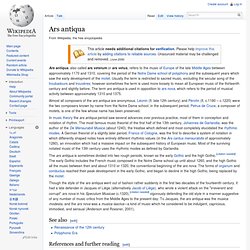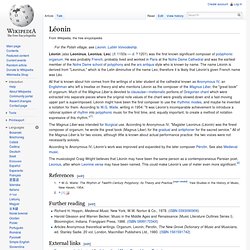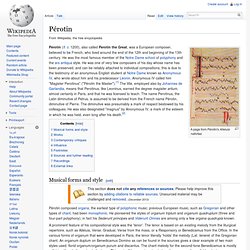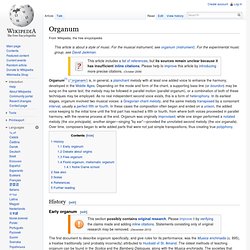

Ars antiqua. Ars antiqua, also called ars veterum or ars vetus, refers to the music of Europe of the late Middle Ages between approximately 1170 and 1310, covering the period of the Notre Dame school of polyphony and the subsequent years which saw the early development of the motet.

Usually the term is restricted to sacred music, excluding the secular song of the troubadours and trouvères; however sometimes the term is used more loosely to mean all European music of the thirteenth century and slightly before. The term ars antiqua is used in opposition to ars nova, which refers to the period of musical activity between approximately 1310 and 1375.
Almost all composers of the ars antiqua are anonymous. Léonin (fl. late 12th century) and Pérotin (fl. c.1180 – c.1220) were the two composers known by name from the Notre Dame school; in the subsequent period, Petrus de Cruce, a composer of motets, is one of the few whose name has been preserved. See also[edit] References and further reading[edit] Léonin. Léonin (also Leoninus, Leonius, Leo) (fl. 1150s — d. ?

1201) was the first known significant composer of polyphonic organum. He was probably French, probably lived and worked in Paris at the Notre Dame Cathedral and was the earliest member of the Notre Dame school of polyphony and the ars antiqua style who is known by name. The name Léonin is derived from "Leoninus," which is the Latin diminutive of the name Leo; therefore it is likely that Léonin's given French name was Léo.
All that is known about him comes from the writings of a later student at the cathedral known as Anonymous IV, an Englishman who left a treatise on theory and who mentions Léonin as the composer of the Magnus Liber, the "great book" of organum. Much of the Magnus Liber is devoted to clausulae—melismatic portions of Gregorian chant which were extracted into separate pieces where the original note values of the chant were greatly slowed down and a fast-moving upper part is superimposed. References[edit] Richard H. Pérotin. A page from Pérotin's Alleluia nativitas Musical forms and style[edit] Pérotin composed organa, the earliest type of polyphonic music; previous European music, such as Gregorian and other types of chant, had been monophonic.

He pioneered the styles of organum triplum and organum quadruplum (three and four-part polyphony); in fact his Sederunt principes and Viderunt Omnes are among only a few organa quadrupla known. A prominent feature of his compositional style was the 'tenor'. The tenor is based on an existing melody from the liturgical repertoire, such as Alleluia, Verse; Gradual, Verse from the mass, or a Responsory or Benedicamus from the Office. Organa exist for two to four voices.
There is another group of new compositions on new texts, the conductus, which exist in a variety of forms: monophonic strophic songs and simple or complex conductus for two to four voices. Works[edit] Contemporary critiques[edit] Influence[edit] [edit] Sources and further reading[edit] Anonymous 4 (1864–76). Organum. History[edit] Early organum[edit] The first document to describe organum specifically, and give rules for its performance, was the Musica enchiriadis (c. 895), a treatise traditionally (and probably incorrectly) attributed to Hucbald of St.

Amand. The oldest methods of teaching organum can be found in the Scolica and the Bamberg Dialogues, along with the Musica enchiriadis. The societies that have developed polyphony usually have several types of it found in their culture. One of the most astounding features of organum (meaning "to sing in Symphoniae") is the similarity of the repertory in different manuscripts. The history of organum would not be complete without two of its greatest innovators, Léonin and Pérotin. Debate about origins[edit] Scholarship has not yet established[weasel words] whether this early organum was chronologically derived from a more primitive strict parallelism, or from a kind of modally-constrained heterophony. Free organum[edit]